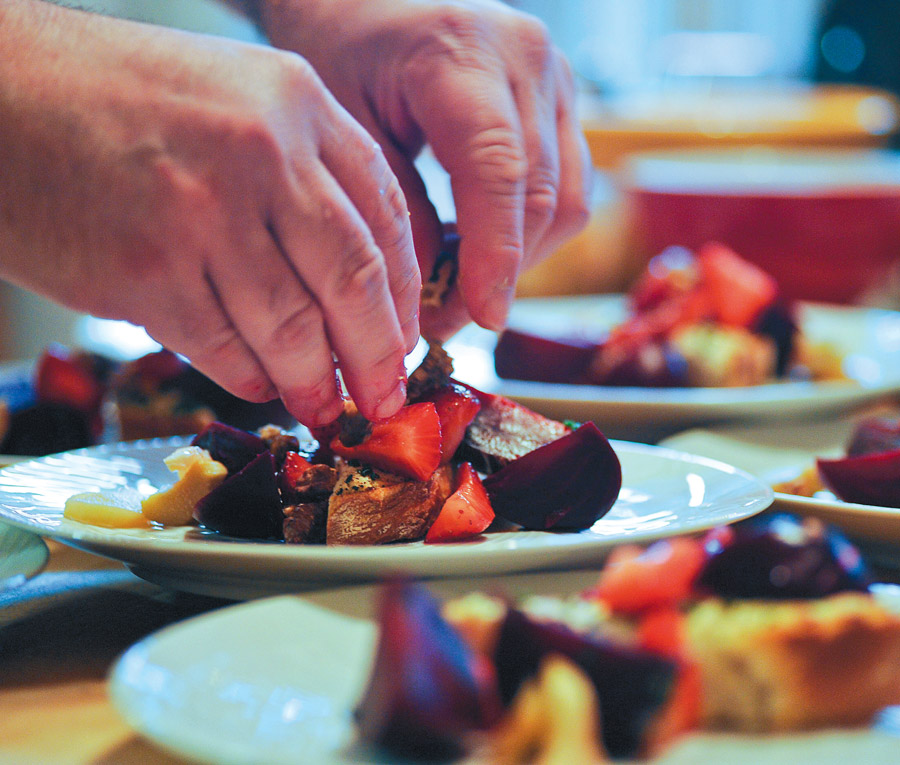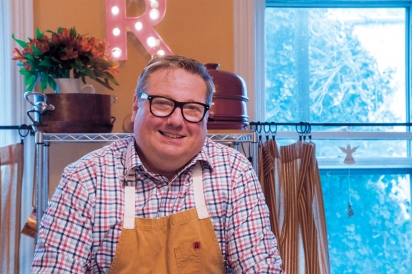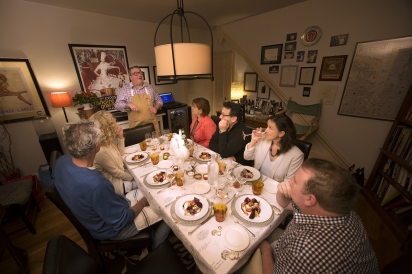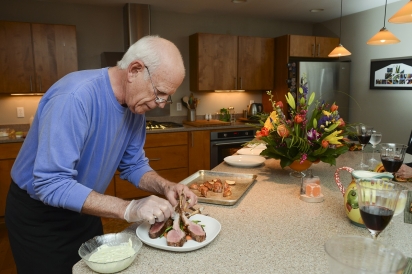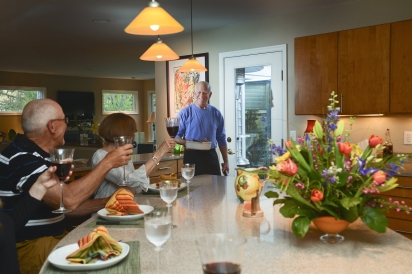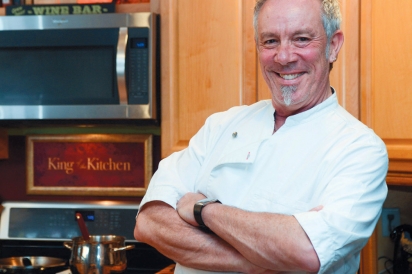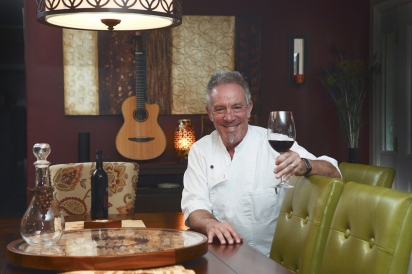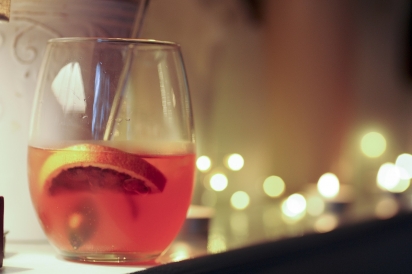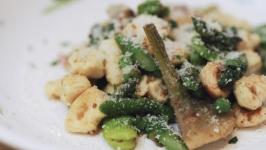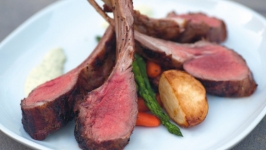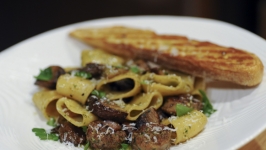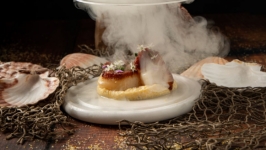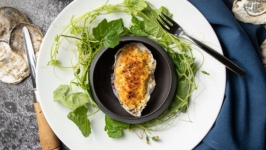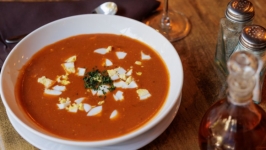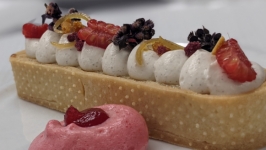Be Our Guest: Pop Up Dining
Pop-up dinners bring top chefs right into your kitchen
It was the perfect dinner for eight. Candles cast a soft light on fresh flowers, and china gleamed on crisp table linens. Each course was a marvel; every wine was exquisite. Beets and strawberries, the colors of precious gems, shown alongside paper thin slices of tart rhubarb, baked goat cheese, nuts and herbs. A bowl held pillowy ricotta gnocchi with artichokes, asparagus, peas, lemon zest and fava beans. Duck—sliced and fanned across the plate—was served with Swiss chard, and potatoes in tarragon and foie gras fat. And for dessert: Nutella cheesecake.
Satiated and slightly tipsy, I sipped my dessert wine and patted myself on the back for a job well done. However, I’d neither cooked nor cleaned. I’d just emailed Robert Lhulier, whose Wilmington-based company, Robert Lhulier Cuisine, features pop-up dinners.
Not familiar with a pop-up? Common in urban areas—and on “Top Chef”—a pop-up is a restaurant-quality meal prepared by a pro in a nonrestaurant environment. In my case, we were in an intimate apartment in the city.
Lhulier isn’t the only entrepreneur in the Delmarva region who is tickling guests’ taste buds. Bethany Beach-based Home on Your Range, owned by former restaurateur Jonathan Spivak, and musician/personal chef Paul Cullen, who is based outside Lewes, are also stepping up to the pop-up plate.
Each offers a different but memorable experience, and the meals showcase their colorful backgrounds. Although they make it look easy, successfully pulling off a pop-up is no small feat.
The Complete Package: Robert Lhulier, Robert Lhulier Cuisine
Robert Lhulier’s skill as a pop-up prince was cultivated in restaurant kitchens that were pressure cookers on bustling nights. He’s worked in award-winning restaurants and owned his restaurant in Historic New Castle.
But many of these jobs didn’t reflect his diverse interests. Before he graduated from the Culinary Institute of America, Lhulier had earned a degree in art from the University of Delaware. (He studied printmaking.) He’s also worked as a DJ.
“I wanted to bring all of the elements of my career together in one job to get the maximum enjoyment out of my work,” says Lhulier, who has cooked at the James Beard House. “Artists need to create. If I do the same thing over and over, I lose interest.” Pop-ups give him freedom; he never replicates a menu in the same fashion.
Lhulier mines Italy, France and Spain for inspiration. “I create riffs on seasonal favorites,” he says. “However, I feel like I can cook anything. By request, I’ve prepared vegetarian, Cuban, Chinese, Japanese, Basque, Provencal, Venetian, Moroccan and regional American cuisine—if you’ve got a favorite, let’s talk.”
Most dishes are plated; some are served family-style. (Lhulier also caters events, such as wedding receptions.) Lhulier consults with the primary point person on the menu, which for a pop-up includes four courses and hors d’oeuvres, such as fava bean hummus or plump, sweet strawberries stuffed with prosciutto.
Depending on the venue, pop-ups are typically for six or eight diners. Lhulier, who has prepared meals for guests from Coatesville, Pennsylvania, to Cape May, doesn’t like to leave anything to chance. He has up to 30 candles and fresh floral arrangements ready. If the menu follows a theme, such as French cuisine, the linens and china strengthen it. He even picks the music, which is selected to suit the guests, he says.
Success comes from a combination of four elements: food, setting, ambiance and timing. “If you botch the timing, you’ve failed,” he says. “For the experience that I’m providing, there can’t be any perception of guests feeling rushed or the evening not taking too long. When all the elements come together, it’s pure popup magic.”
> lhulier.com; 302-494-7556
The Seasoned Entrepreneur: Jonathan Spivak, Home On Your Range
Jonathan Spivak is a man of many hats. The native New Yorker graduated from the University of Denver with a degree in psychology and handled marketing for a Rockville, Maryland-based research firm. He was also a consultant to law firms undergoing mergers and acquisitions.
Despite his success, he’d always wanted to own a restaurant, a dream that dated back to his childhood. Bored when his relatives started talking Yiddish in restaurants, he occupied himself by catching glimpses of the action behind the kitchen door. The desire increased as he dined across the country when he traveled for work.
In 1993, without ever having worked in a restaurant, he opened Sedona in Bethany Beach, which became a big hit despite or maybe because of the Southwestern theme. He repeated his success with Fusion in Rehoboth Beach. By 2008, he’d sold both restaurants but retained Fusion’s real estate. When Fusion closed in 2009, he opened Salt Air in the space. While fighting Stage 3 lymphoma, he sold Salt Air to the Big Fish Group. “The prognosis was bleak,” he recalls.
After going through a grueling treatment, he had a new lease on life. He pursued his art, something he’d enjoyed in the 1980s. His work appeared in galleries and made sales, but “I found out pretty quickly that it’s much easier to sell food than art,” he says. Seeing the faces on happy diners provided the same gratification as selling a painting but without the frustration that comes from the artist's life. But he didn’t want to own a restaurant again.
Home on Your Range, which provides customized dinners for in-home parties and cooking demonstrations, was the answer. The typical service is for six to 12 guests. Spivak provides the ingredients, preps and makes the four-to-five courses. The host provides the table setting. Thanks to his artistic background, expect a plate that is a feast for the eyes as well as the palate.
Most of his customers are locals or own a vacation home. But he’s cooked three dinners in Westport, Connecticut, and traveled to Annapolis, Severna Park, Maryland, and Vero Beach, Florida.
Home on Your Range removes the wall between the kitchen and the guests that exists in a restaurant, he says. He can casually interact with the diners while avoiding the overhead, payrolls and “the other headaches."
As he put it on his website: “I believe that the dining room and kitchen are where a true sense of community and closeness thrive. It is an intimate time where family and friends have an opportunity for closeness and sharing. To be part of that and create delicious food to be shared is the reward for any chef.”
> homeonyourrange.net; 302-236-2707
Tune Your Palate: Paul Cullen
Playing to a crowd is something that Paul Cullen does well. He played bass with the rock group Bad Company, and he’s performed solo and with other musicians in the Delmarva area.
Along with his love for music, he’s long had an infatuation with food, particularly Italian cuisine. Credit his grandmother, Elsie Tagliaferro. As a child growing up in Buffalo, New York, he would help her prepare Thanksgiving dinner, which included the usual staples, as well as sauce with meatballs, pork sausage and at least 100 ricotta ravioli. He admired her ability to whip together a feast on the spur of the moment when friends and family visited unannounced.
While touring abroad with Bad Company, he developed a love for wine, which he pursued after moving to coastal Delaware in 2001 to be with wife-to-be Bonnie. He’s been a wine rep and helped a restaurant develop a wine program. He also had a wine company, Sonata, which featured a silhouette of Cullen playing guitar on the label.
When the wine business wound down, he played gigs around the resort towns and hosted parties at home featuring his grandmother’s dishes. After dinner, he often played guitar for his guests. “That’s how it evolved,” he recalls. “A friend asked if I could cook at his house and bring my guitar.” A few of those guests also asked for his services. He launched the business in 2013. The dinners have eclipsed his gigs. Pop-ups soared up to 75 percent of his income in 2015 and 90 percent in 2016, the year he cooked for more than 2,000 guests, he says.
Cullen, who’s “popped up” in kitchens from Chicago to Florida, tells the curious that he “takes over their kitchen” to prepare four Italian courses. He offers the guests antipasti and invites them to wander into the kitchen at will and ask questions. “It’s kind of like a cooking demo,” he says. Today’s open kitchens accommodate the format. Homemade pasta is usually on the menu, and risotto is always a crowd favorite.
The post-game concert lasts about 45 minutes. “And your kitchen will be as clean or cleaner than when I got there,” he says. He will bring everything from pots and pans to flatware, if needed. “It’s a long day,” he says, “but I get in my car and go: ‘Gosh, that feels great!’”
> paulcullenguitar.com; 302-228-9775
Thinking of hosting a pop-up? Here are some tips.
Do ask guests about their dietary preferences. “I ask about dietary restrictions and extreme food dislikes,” Cullen says.
Don’t try to accommodate each and every guest. A pop-up is not the time for every guest to have it his or her way. “The more details, the more challenging,” Lhulier says. “To mix vegan dinners with regular cuisine is like trying to speak two languages at once to the same group and remain coherent. It’s a high wire to walk.”
Do ask what the chef might need. Many have learned by experience to pack a kit. Cullen brings portable burners, for instance. Still, it can’t hurt to ask.
Don’t start the evening with a full dishwasher. An empty one makes cleanup faster. Also make room in the fridge for the chef’s supplies.
Do be flexible. Rice can burn and traveling chefs are only human; occasionally, an ingredient goes missing. Most chefs are adept at improvisation. Instead of butternut squash ravioli, you might have butternut squash if the flour was left at home.
Do have fun. “A party is only as vibrant as the people you invite,” Lhulier says. “Don’t fear foods – embrace them! Drink wines you like and have never tried. Give up control. Trust the chef. And finally, relax!”


